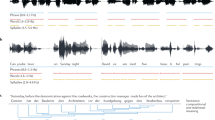Abstract
George A. Miller said that human beings have only seven chunks in short-term memory, plus or minus two. We counted the num- ber of bunsetsus (phrases) whose modifiees are undetermined in each step of an analysis of the dependency structure of Japanese sentences, and which therefore must be stored in short-term memory. The num- ber was roughly less than nine, the upper bound of seven plus or minus two. We also obtained similar results with English sentences under the assumption that human beings recognize a series of words, such as a noun phrase (NP), as a unit. This indicates that if we assume that the human cognitive units in Japanese and English are bunsetsu and NP respectively, analysis will support Miller’s 7 ± 2 theory.
A chunk is a cognitive unit of information.
Access this chapter
Tax calculation will be finalised at checkout
Purchases are for personal use only
Preview
Unable to display preview. Download preview PDF.
Similar content being viewed by others
References
Charles J. Fillmore. The case for case. In Emmon Bach and Robert T. Harms, editors, Universals in Linguistic Theory, pages 1–88. Holt, Rinehart and Winston, Inc., 1968.
John Kimball. Seven principles of surface structure parsing in natural language. Cognition, 2(1):15–47, 1973.
Sadao Kurohashi and Makoto Nagao. Kyoto University text corpus project. pages 115–118, 1997. (in Japanese).
Richard L. Lewis. Interference in Short-Term Memory: The Magical Number Two (or Three) in Sentence Processing. Psycholinguistic Research, 25(1):93–115, 1996.
Mitchell P. Marcus, Beatrice Santorini, and Mary Ann Marcinkiewicz. Building a large annotated corpus of English: the Penn Treebank. Computational Linguistics, 19(2):310–330, 1993.
George A. Miller. The magical number seven, plus or minus two: Some limits on our capacity for processing information. The Psychological Review, 63:81–97, 1956.
Geoffrey Sampson. Depth in English grammar. Journal of Linguistics, 33:131–151, 1997.
Victor H. Yngve. A Model and an Hypothesis for Language Structure. the American Philosophical Society, 104(5):444–466, 1960.
Author information
Authors and Affiliations
Editor information
Editors and Affiliations
Rights and permissions
Copyright information
© 2001 Springer-Verlag Berlin Heidelberg
About this paper
Cite this paper
Murata, M., Uchimoto, K., Ma, Q., Isahara, H. (2001). Magical Number Seven Plus or Minus Two: Syntactic Structure Recognition in Japanese and English Sentences. In: Gelbukh, A. (eds) Computational Linguistics and Intelligent Text Processing. CICLing 2001. Lecture Notes in Computer Science, vol 2004. Springer, Berlin, Heidelberg. https://doi.org/10.1007/3-540-44686-9_4
Download citation
DOI: https://doi.org/10.1007/3-540-44686-9_4
Published:
Publisher Name: Springer, Berlin, Heidelberg
Print ISBN: 978-3-540-41687-6
Online ISBN: 978-3-540-44686-6
eBook Packages: Springer Book Archive




